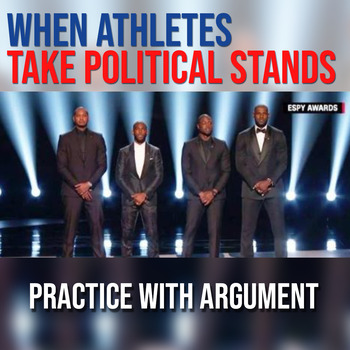When Athletes Take Political Stands: Argument Practice
- PDF
Also included in
- Baseball, football, basketball, soccer, and boxing are represented in this mega bundle of sports-themed extended lessons. The ethics of sports, politics, injuries, identities, and responsibilities of premier athletes as role models are covered. Students will read, view, write about and discuss sportPrice $47.60Original Price $68.00Save $20.40
Description
The last decade has included a national conversation of athletes taking political stances. Most teens have an opinion about athletes kneeling for the Pledge of Allegiance, wearing the name of Black people killed by law enforcement, speaking out about indigenous people's rights, using the platform of their athletic fame, or supporting the LGBTQ community. This lesson encourages students to grapple with and discuss a hot button contemporary issue and write an argument essay.
- Students learn about a variety of athletes taking political stances.
- Students will read, listen to, and view supporting video and audio clips while learning the necessary elements to establish their argument on the theme of sports and activism.
- Students will show mastery of the standards at the end of the lesson through a SOAPSTone Analysis, short paragraph assessments, a Socratic seminar, and a written timed argument essay scored on an AP English-style rubric.
- The central text is The Atlantic Monthly essay, “When Athletes Take Political Stands” by Matt Vasilogambros.
- The students will complete an evaluation of the author's purpose graphic organizer on this essay.
- Sources include video links to The TALK, What Can We Learn From College Athletes? by Kendall Spencer, “Athletes as Activists: Lessons from Black Lives Matter and Beyond from the Moody College of Communication at the University of Texas at Austin” and “Kaepernick and The Summer of 2016: How will history write him.?
- Another source curated for the lessons is Howard Bryant's book “The Heritage and the Legacy of Activism for Black Athletes.”
- Links include different NPR clips and New York Times articles and many videos showing the unit's themes.
- Students will write a short paragraph about Paul Robeson and Jackie Robinson’s activism.
- Students will listen to an NPR Fresh Air interview with Howard Bryant, and on charts provided in the appendix, they will complete the evaluation of ethos, logos, and pathos.
- There is a lesson on the rhetorical situation on The New York Times op-ed, “Famous Athletes Have Always Led the Way“ by Michael Eric Dyson.
- The students will complete a PAPA Square for Rhetorical Analysis for The New Yorker essay, “Recalling Muhammad Ali’s Vietnam War Resistance in the Age of Trump,” by David Remnick.
- An opportunity for an Audience Analysis using The New York Times essay “The Awakening of Colin Kaepernick,” by John Branch.
- The lesson set provides explication and a build context, an original argument essay prompt on African American athletes and activism.
These eight daily lessons fit any Honors Literature class, Pre-AP, American Literature, AP English Language or Literature class to prepare students for AP English Language exams, Common Core extended response assessments, American Literature Course exams, the SAT and ACT essay, and critical thinking activities.
New in 2018:
Reformatted and added four more lessons. Fixed links. Reworked the writing prompt. Added more video and audio links, print sources, and exercises for the rhetorical situation, the purpose, and audience analysis. The resource is up to 30 pages.






